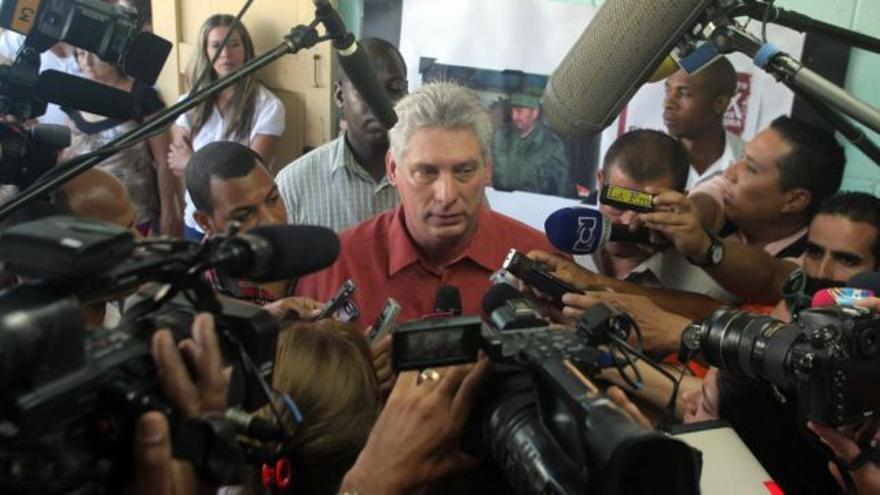
![]()
14ymedio, Lucía Leal (writing for EFE, in conjunction with 14ymedio), April 19, 2008 — The United States has no plans to alter its antagonistic policy towards Cuba now that Miguel Díaz-Cane is president. In fact, relations between the two Cold War enemies could even get worse in the next three years according to experts interviewed by EFE.
Díaz-Canel became president of Cuba on Thursday and will remain in office at least until the next Cuban Communist Party Congress in 2011, the same year the first term of the US president Donald Trump ends.
The first Cuban leader whose last name is not Castro in six decades, Díaz-Canel must manage a complex relationship with Trump, who has halted the normalization process begun by former President Barack Obama, restricting trade and travel to the island.
“We love Cuba. We are dealing with Cuba,” Trump said during a visit to the Florida Keys today.
A White House source told EFE that he “doubted” Trump planned to congratulate Díaz-Canel on becoming president, adding that Washington held out little hope of seeing any change in Cuba under the new leader and that it would maintain a hard line towards Havana.
“We don’t anticipate changing our policy of directing resources to the Cuban people and away from the Cuban military, security and intelligence services,” said the official.
Those who follow the bilateral relationship closely believe that it could become even more tense in the coming months due to the presence in the Trump administration of a new national security adviser, John Bolton, along with the current CIA director and nominee to be Secretary of State, Mike Pompeo.
Both have adopted a hard line towards Cuba. Bolton went so far as to falsely accuse the island in 2002 of having a biological weapons program of mass destruction and his arrival at the White House this month has caused alarm in Havana.
The combined effect of this new foreign policy team and the influence of Marco Rubio, a Republican senator with Cuban roots and a staunch defender of the US embargo, could lead to new hostile actions by the White House.
“The chances of a hard line [towards Cuba] are better than ever,” says Peter Hakim, president emeritus and senior fellow at the Inter-American Dialogue think tank.
“Both Pompeo and Bolton have been extremely critical of Cuba, so we could very well see a US policy even more hostile towards Cuba in the coming months,” says William LeoGrande, a specialist in Latin American politics at American University and author of a book on the normalization of relations between Cuba and the United States.
Marguerite Jiménez, director for Cuba at the Washington Office for Latin America (WOLA), believes that Bolton could “fill the White House National Security Council” with officials who think like him, opening up the possibility of greater antagonism.
The degree of influence these two officials exert will be decisive considering that Trump’s policy towards Cuba is a response to a firm promise he made to hardcore anti-Castro supporters during the final stretch of his 2016 electoral campaign in Florida — a key state — to be tough on the Castros.
Trump signaled this week that, although it makes up a small percentage of the overall American electorate, he still considers Florida to be an important base of support. Recently, he granted an interview in southern Florida to a local affiliate of the Spanish language television network Univisión and to Miami-based Radio Mambí.
“We are being very hard with respect to Cuba because we want the people to have freedom. We have great support for the Cuban people,” said Trump in the interview on Monday.
Even taking into account Trump’s concern for his electoral base and the negotiations he has held with Rubio to gain the senator’s support on other issues, the attention his government has paid to Cuba — a country of little geostrategic value to the United States — is hard to explain.
“Last year the island received a level of attention that was disproportionate given the pressing challenges the US faces in other parts of the world,” says Robert Braga, a Cuba expert at the Atlantic Council.
WOLA’s Jiménez does see one reason for hope, however: Pompeo’s hint during his Senate confirmation hearing last week that the United States might strengthen its diplomatic presence in Havana.
According to press reports, only ten officials remain at the vast American diplomatic compound in Havana after Trump decided to reduce the embassy staff to a minimum in response to alleged sonic attacks on US personnel there.
__________________________
The 14ymedio team is committed to serious journalism that reflects the reality of deep Cuba. Thank you for joining us on this long road. We invite you to continue supporting us, but this time by becoming a member of 14ymedio. Together we can continue to transform journalism in Cuba.
